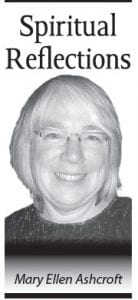Do you believe?
What does it mean to believe? This question is central to most religious misunderstandings. “How can anybody believe that?” we ask ourselves about others” beliefs.
When Mark Twain was asked if he believed in infant baptism, he famously responded, “Believe in it? I’ve seen it!” Twain’s quip moves us to the heart of the problem, as he uses the word “believe” in its two different forms—intellectual assent and commitment to.
What does it mean to believe? As to the word itself—“bileave” (Old English from West Germanic) meant “to hold dear, to esteem to trust.” Belief was closely akin to love. It was only in the 16th century that the word began to mean “mental acceptance of something as true.”
This turn—from belief as “holding dear” to belief as intellectual assent is the problem. We can’t really know what “belief ” meant to Moses, but we can be pretty sure that for members of the early Christian movement, “belief ” meant commitment to the Jesus Way.
The 16th century brought modernist thought—with its emphasis on the rational, the provable, and the individualistic (Descartes’ “I think therefore I am.”). Here the best kind of knowledge of (and belief about) the world was rational, objective, and scientific, and if some idea didn’t meet this standard, well then it’s wrong. (Note that in “modernist” thinking, presuppositions are not questioned—the “enlightenment [instituted] a tradition that prides itself on not being a tradition,” wrote Gadamer. In other words objective, rational, scientific thinking assumes its own correctness just as other belief systems do. Most of us grew up believing that rationalism was really the best kind of thinking.
With this paradigm shift to modernist thought, the idea of “belief ” also shifted, so that to say, “I believe” became, “I give intellectual assent to the proposition that….”
This makes church difficult for most of us! Let’s say you visit a church and are expected to recite the Nicene Creed. “We believe,” you start and therefore feel you’re supposed to give intellectual assent to these items: “begotten not made, of one being with the Father”—huh? “the resurrection from the dead…” what? “judge the living and the dead,” are you kidding? If you doubted these but said them, you’d be a hypocrite. No wonder many people stopped going to church!
Thankfully we are in another paradigm shift away from modernist thought, one in which we needn’t equate belief with rational assent. Postmodern thinkers have accepted the idea that “all knowledge is rooted in some narrative or myth” and that there are faith commitments inherent in all knowledge-claims (including both scientific and religious ones).
In this new paradigm, people are recognizing the poverty of a worldview that exalts the objective and the rational. It’s as if our world is waking from a weird dream in which reason trumped all. As we awaken we think, “Of course, I’ve always known that the most important things were beyond reason—love, peace, mystery, joy—that some of the greatest truths are found in poetry, in art.”
But as with any huge paradigm shift, it’s a complex process and we’re at an awkward stage. These kinds of turnings, when ways of knowing are shifting, when the propositional truths that seemed so constant no longer are—this makes people anxious. (Some thinkers argue that fanatical Creationism and even the Tea Party movement are indicative of this anxiety.)
And some of us end up straddling modernism and postmodernism. I talk to people who pride themselves on being open to all kinds of spirituality… except the great faith traditions. At some level they are holding onto that “old time religion” in which they were raised, one demanding intellectual assent to some bizarre ideas—for example, that everyone who is not Christian is going to hell, or the perpetual virginity of Mary—and since they can’t give intellectual assent to that….Forget Christianity— with its rich traditions, its mystical practice, its sacramentality, and give me that old time new age religion!
What would it be like to go to church, open to meeting mystery, to experiencing love?
What if, instead of belief, we sought belonging?
What would it be like to join a faith community, asking as Parker Palmer suggests—“How can I connect with something larger than my own ego?”
What if instead of propositional truth about religion, we expected relational community, intentional practice, and experiential belief?
A bishop was asked if he believed in the resurrection.
“Believe it?!” he said. “ I see it every day!”
Each month a member of the Cook County Ministerium will offer Spiritual Reflections. This month’s s contributor is Mary Ellen Ashcroft, Vicar of Spirit of the Wilderness Episcopal Church.



Loading Comments